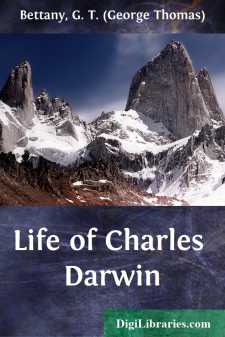Categories
- Antiques & Collectibles 13
- Architecture 36
- Art 48
- Bibles 22
- Biography & Autobiography 813
- Body, Mind & Spirit 142
- Business & Economics 28
- Children's Books 17
- Children's Fiction 14
- Computers 4
- Cooking 94
- Crafts & Hobbies 4
- Drama 346
- Education 46
- Family & Relationships 57
- Fiction 11829
- Games 19
- Gardening 17
- Health & Fitness 34
- History 1377
- House & Home 1
- Humor 147
- Juvenile Fiction 1873
- Juvenile Nonfiction 202
- Language Arts & Disciplines 88
- Law 16
- Literary Collections 686
- Literary Criticism 179
- Mathematics 13
- Medical 41
- Music 40
- Nature 179
- Non-Classifiable 1768
- Performing Arts 7
- Periodicals 1453
- Philosophy 64
- Photography 2
- Poetry 896
- Political Science 203
- Psychology 42
- Reference 154
- Religion 513
- Science 126
- Self-Help 84
- Social Science 81
- Sports & Recreation 34
- Study Aids 3
- Technology & Engineering 59
- Transportation 23
- Travel 463
- True Crime 29
Life of Charles Darwin
Categories:
Description:
Excerpt
CHAPTER I.
If ever a man's ancestors transmitted to him ability to succeed in a particular field, Charles Darwin's did. If ever early surroundings were calculated to call out inherited ability, Charles Darwin's were. If ever a man grew up when a ferment of thought was disturbing old convictions in the domain of knowledge for which he was adapted, Charles Darwin did. If ever a man was fitted by worldly position to undertake unbiassed and long-continued investigations, Charles Darwin was such a man. And he indisputably found realms waiting for a conqueror. Yet Darwin's achievements far transcend his advantages of ancestry, surroundings, previous suggestion, position. He stands magnificently conspicuous as a genius of rare simplicity of soul, of unwearied patience of observation, of striking fertility and ingenuity of method, of unflinching devotion to and belief in the efficacy of truth. He revolutionised not merely half-a-dozen sciences, but the whole current of thinking men's mental life.
The Darwins were originally a Lincolnshire family of some position, and being royalists suffered heavy losses under the Commonwealth. The third William Darwin (born 1655), whose mother was a daughter of Erasmus Earle, serjeant-at-law,[1] married the heiress of Robert Waring, of Wilsford, Notts, who also inherited the manor of Elston, near Newark, in that county, which still remains in the family. Robert Darwin, second son of this William Darwin, succeeded to the Elston estate, and was described by Stukeley, the antiquary, as "a person of curiosity," an expression conveying high commendation. His eldest son, Robert Waring Darwin, studied botany closely, and published a "Principia Botanica," which reached a third edition; but his youngest son, Erasmus, born 1731, was destined to become the first really famous man of the family.
Erasmus Darwin's personal characteristics, his medical talents, and his poetic writings were such as to overshadow, for his own generation, his scientific merit. We have not space here to describe his career and his works, which has been so well done by his grandson, and by Ernst Krause ("Erasmus Darwin," 1879). Horace Walpole regarded his description of creation in "The Botanic Garden" (part i., canto 1, lines 103-114) as the most sublime passage in any language he knew: and The Edinburgh Review (vol. ii., 1803, p. 501) says of his "Temple of Nature": "If his fame be destined in anything to outlive the fluctuating fashion of the day, it is on his merit as a poet that it is likely to rest; and his reveries in science have probably no other chance of being saved from oblivion but by having been 'married to immortal verse.'"
The present age regards it as next to impossible to write science in poetry; although few have succeeded better in the attempt than Erasmus Darwin. It is singular that he should have partially anticipated his illustrious grandson's theories, but without supporting them by experimental proof or by deep scientific knowledge. Suffice it to say now, that Erasmus contemplated to a great extent the same domain of science as Charles Darwin, having also a mechanical turn; and was educated at Edinburgh and Cambridge....


